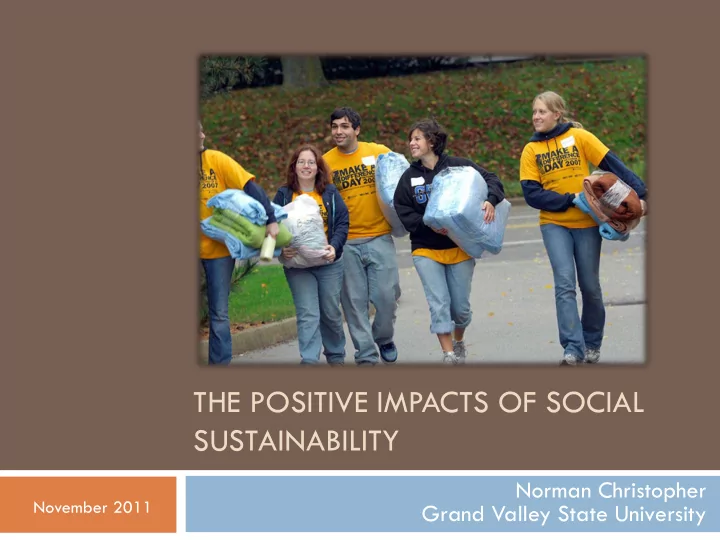

THE POSITIVE IMPACTS OF SOCIAL SUSTAINABILITY Norman Christopher November 2011 Grand Valley State University
The Sustainability Lens! BUSINESS (competitiveness, CASE profitability, growth) Resource Prosperity Eco Socio scarcity conflict Efficiency Efficiency conflict Eco Socio Effectiveness Effectiveness NATURAL CASE SOCIETAL CASE Sufficiency Ecological Equity (resource use, conservation, Services (education, employment, environment) health, quality of life) conflict Source: Adapted Wiley and Sons: T. Dvllick
Stakeholders Regulatory Banks Faith Based Insurance Media Agency Communities Companies City Customers/Client/ Government Consumers Schools, Competitors Colleges, Suppliers/ Universities Your Organization Partners or Business NGO’s Institutional/ Local Pension Fund Neighborhood Managers and Community First Employees/Labor Nations Unions Investment Trade/ Credit Shareholders/ Community Professional Rating Private Organizations Agencies Investors
Capital Formation Natural Knowledge Economic Cultural Community Forms of Capital Advocacy Manufactured Human Shared Networking Social Source: Adapted Toward Sustainable Communities
What is Corporate Social Responsibility? “ Continuing commitment by business to behave ethically and contribute to economic development while improving the quality of life of the workforce and their families as of the local community and society at large ” Transparent business practices Ethical values Compliance with legal requirements Respect for people, communities, environment Beyond making profits Responsibility for totality of their impact on people and planet Source: mcf.org/conference/corporatecitizenship.pdf
What is Corporate Citizenship? “ a recognition that a business , corporation, or business like organization has social, cultural, and environmental responsibilities to the community in which it operates as well as economic and financial ones to its shareholders and stakeholders ” Exhibiting constant life-long life-wide learning; inclusivity; transparency; social and ethical accountability Providing community leadership e.g. visioning Portraying a leadership role model within host community and its stakeholders Having stated sustainable guiding principles, values, and purpose Requiring absolute commitment, and willingness to change Source: mcf.org/conference/corporatecitizenship.pdf
Social Entrepreneurship Social Entrepreneurship encourages taking a new approach to broad social problems, directing the drive, imagination, discipline and accountability inherent in entrepreneurship at society’s most pressing issues and thereby creating a mechanism for creating lasting social value. It holds the breathtaking prospect of creating nothing less than the next generation of social problem-solvers and leaders . When one thinks of the seemingly intractable difficulties that will confront our children and our children’s children in the decades to follow --- global warming, nuclear proliferation, international competition for energy and natural resources, large and growing inequities in income in the United States, spreading prosperity to the developing world, the creation of a new definition of national and international security --- it is clear that a very new set of tools will be needed . The emerging field of Social Entrepreneurship offers the prospect of creating those tools: crossing disciplines and sectors to frame solutions , finding new incentive structures , applying new ideas and techniques to solving society’s most pressing problems, and offering new exciting opportunities for public service. A generation from now, the laurels for solving some enormous problems may well go to some “Social Entrepreneur.” Source: J.C. Canepa, February 7, 2006
Social Enterprise Supply and Demand Supply is Up Demand is Up • Poverty • Freedom • Health catastrophes • Time • Human rights issues • Wealth • Failing education systems • Health • Escalating violence • Exposure • Natural disasters • Social Mobility • Environmental destruction • Confidence • Child trafficking • Capabilities Source: David Bornstein, How to Change the World
Why Social Business? Delinks from traditional business frameworks that does not accommodate new objectives within existing frameworks Exists to solve social problems while using business technologies and models Offers options to investors by operating in a open economy with free choice Enhances competition and freedom of choice by giving more people more choices of goods and services Offers promising alternatives to failed government programs Is less exposed to downside risk during economic downtimes Represents a new way to express entrepreneurism Provides an outlet for creativity Affords opportunity for individual renewal Is a great learning process Helps the public and private sectors share the burden of responsibilities for social change Can help solve neighborhood problems and concerns Source: Muhammad Yunus, Building Social Value
Social Entrepreneurship Paradigm Shifts 1. Eliminating the Gift Mentality Charity Gift Investment Gift Nothing expected Something expected in return Small, not a major value Large, of major value Social and cultural emphasis Business emphasis Better to give then to receive A penny earned is a penny saved Hope that receiver will appreciate Expectation that gift will perform gift 2. Emphasis on results and “bottom line” impact 3. Shift away from “emotional” approach Source: Tom Ralser, ROI for Non-Profits
Social responsibility Source: Strathcona County
Contact Information: Norman Christopher Director, Sustainable Community Development Initiative Grand Valley State University 616-331-7461 chrisfn@gvsu.edu gvsu.edu/sustainability
Recommend
More recommend